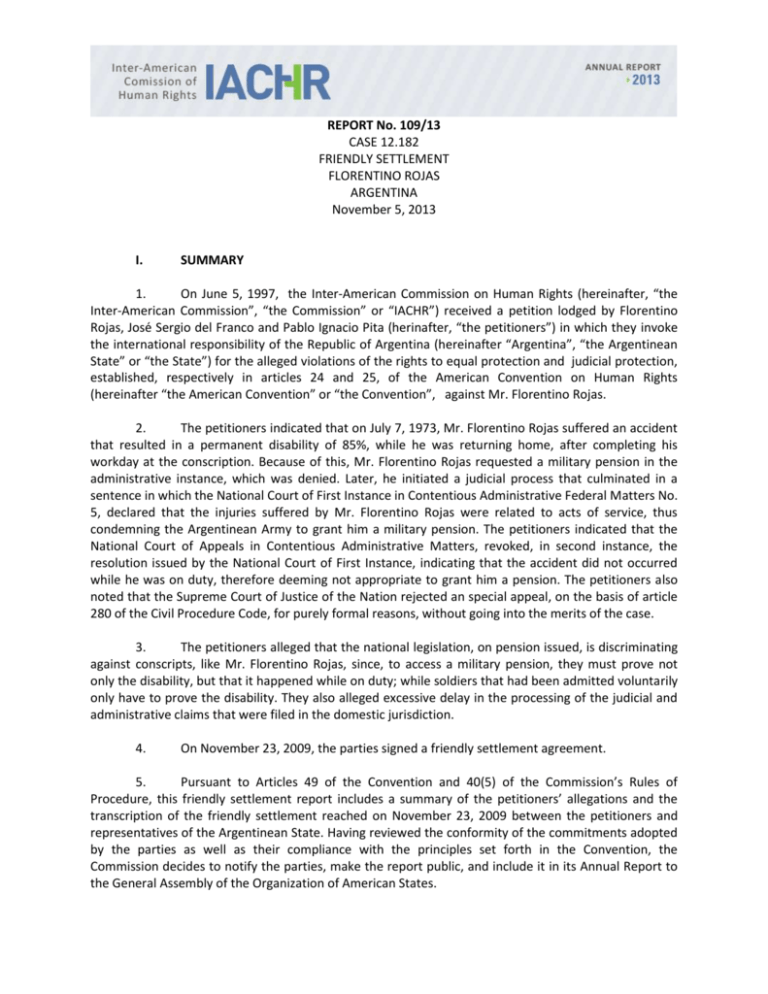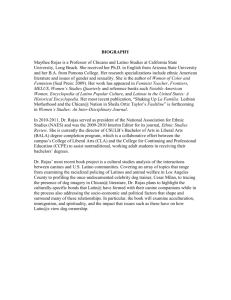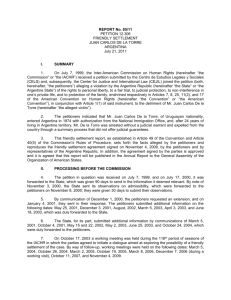Report No. 109/13 - Organization of American States
advertisement

REPORT No. 109/13 CASE 12.182 FRIENDLY SETTLEMENT FLORENTINO ROJAS ARGENTINA November 5, 2013 I. SUMMARY 1. On June 5, 1997, the Inter-American Commission on Human Rights (hereinafter, “the Inter-American Commission”, “the Commission” or “IACHR”) received a petition lodged by Florentino Rojas, José Sergio del Franco and Pablo Ignacio Pita (herinafter, “the petitioners”) in which they invoke the international responsibility of the Republic of Argentina (hereinafter “Argentina”, “the Argentinean State” or “the State”) for the alleged violations of the rights to equal protection and judicial protection, established, respectively in articles 24 and 25, of the American Convention on Human Rights (hereinafter “the American Convention” or “the Convention”, against Mr. Florentino Rojas. 2. The petitioners indicated that on July 7, 1973, Mr. Florentino Rojas suffered an accident that resulted in a permanent disability of 85%, while he was returning home, after completing his workday at the conscription. Because of this, Mr. Florentino Rojas requested a military pension in the administrative instance, which was denied. Later, he initiated a judicial process that culminated in a sentence in which the National Court of First Instance in Contentious Administrative Federal Matters No. 5, declared that the injuries suffered by Mr. Florentino Rojas were related to acts of service, thus condemning the Argentinean Army to grant him a military pension. The petitioners indicated that the National Court of Appeals in Contentious Administrative Matters, revoked, in second instance, the resolution issued by the National Court of First Instance, indicating that the accident did not occurred while he was on duty, therefore deeming not appropriate to grant him a pension. The petitioners also noted that the Supreme Court of Justice of the Nation rejected an special appeal, on the basis of article 280 of the Civil Procedure Code, for purely formal reasons, without going into the merits of the case. 3. The petitioners alleged that the national legislation, on pension issued, is discriminating against conscripts, like Mr. Florentino Rojas, since, to access a military pension, they must prove not only the disability, but that it happened while on duty; while soldiers that had been admitted voluntarily only have to prove the disability. They also alleged excessive delay in the processing of the judicial and administrative claims that were filed in the domestic jurisdiction. 4. On November 23, 2009, the parties signed a friendly settlement agreement. 5. Pursuant to Articles 49 of the Convention and 40(5) of the Commission’s Rules of Procedure, this friendly settlement report includes a summary of the petitioners’ allegations and the transcription of the friendly settlement reached on November 23, 2009 between the petitioners and representatives of the Argentinean State. Having reviewed the conformity of the commitments adopted by the parties as well as their compliance with the principles set forth in the Convention, the Commission decides to notify the parties, make the report public, and include it in its Annual Report to the General Assembly of the Organization of American States. 2 II. PROCESSING BY THE COMMISSION 6. The petition was presented on June 5, 1997, before the national office of the OAS in Buenos Aires, Argentina. The IACHR forwarded the pertinent parts of the petition to the Argentinean State on Junes 17, 1999 and asked to present a response within a period of 3 months. The State presented its observations through communications dated December 14, 1999; August 31, 2000; March 21 and September 21, 2001 and October 1, 2002. Later, the Commission received additional information from the State on April 29 and November 4, 2009. On January 27, 2010, the Commission received a copy of the friendly settlement agreement signed between the National Government and Mr. Florentino Rojas on November 23, 2009. The IACHR received additional information on March 16, July 1 and November 21, 2011; July 17 and October 19, 2012 and; January 4, February 22 and May 10, 2013. On June 12, 2013, the State presented before the IACHR copy of the Decree No. 445/13, by which the President of the Nation, decrees approved the Friendly Settlement Agreement signed between the petitioner Florentino Rojas and the National Government. 7. For their part, the petitioners sent their observations through communications received on February 21, 2000; December 29, 2000; June 9, 2001; December 4, 2001 and April 29, 2009. Later, the Commission received additional information on October 1st, 2nd and 8. 2009; January 4, February 17, May 30 and August 10, 2011; August 8, 2012 and April 15, 2013. 8. On August 4, 2009, during the 135th Ordinary Period of Sessions, the Commission approved the Admissibility Report No. 64/09 in which decides to declare the case admissible in relation to the violations of the rights recognized in articles 8(1) and 25, in relation to article 1(1) of the American Convention. The petitioners requested to go to a friendly settlement on October 8, 2009 and sent communications on October 1 and 2, 2009, on January 4, February 17, May 30 and August10, 2011, August 8, 2012 to April 15, 2013, which were forwarded to the State. For its part, the State submitted additional information on November 4, 2009 stating that the parties were negotiating the terms of an amicable solution. The January 27, 2010, sending the friendly settlement agreement, and additional information on March 16, July 1 and November 21, 2012, July 17 and October 19, 2012, and January 4, February 22, May 10, June 12 and October 18 2013, all such communications were sent to the petitioners. III. ALLEGED FACTS 9. The petitioners indicated that on July 7, 1973, Mr. Florentino Rojas suffered a car accident while he was returning home after completing his workday in the conscription. Due to this situation, Mr. Florentino Rojas requested a military pension in the administrative instance, and an administrative file was initiated under the name “Rojas Florentino c/ Estado Nacional (Ejército Argentino) s/ pension military”. On June 28, 1985 he received a notification in which they denied the pension on the grounds that his condition was not related to any act of service. 10. The petitioners indicated that on August 19, 1985, Mr. Rojas filed a notice of appeal, however, he could not supported it because the authorities systematically denied him the opportunity to see the administrative proceedings, despite having submitted an order for immediate dispatch to see them. In this situation, the petitioners filed a claim for constitutional protection (Amparo) against the Medical Command of the Argentinean Army in order to be allowed to see the proceedings. On December 16, 1986, the claim was declared admissible and Mr. Florentino Rojas had access to the 3 proceedings. On May 28, 1987, the Argentinean Army ratified the administrative decision of not granting him the pension. 11. The petitioners presented a lawsuit (they do not indicate the date of the lawsuit) before the National Court of First Instance in Federal Contentious Administrative Matters N° 5. On March 16, 1994, the court stated that the injuries suffered by Mr. Florentino Rojas were related to acts in service because they were considered “in itinere”, and it ordered the Argentinean Army to grant him the military pension. The Argentinean Army brought an appeal before the National Chamber of Appeals in Contentious Administrative Matters and, on October 17, 1994, the judgment of first instance was revoked because the court considered that the injuries suffered by Mr. Rojas were not related to acts of service. The petitioners indicated that during the process, all the evidence submitted by Mr. Florentino Rojas disappeared and that the resolution of the Chamber of Appeals was based on transcriptions of the file. The petitioners also alleged that during the process, the judge did not conduct a complete and effective analysis of the evidence and took into consideration facts that did not correspond to the reality of the events. 12. In the petition, the petitioners indicated that the right of equality before the law was violated because, when it comes to military pensions, conscripts must prove that the event that caused the disability occurred during an act of service, a condition that is not required to members of the army that join the ranks voluntarily. 13. Mr. Rojas indicated that the accident left him with a disability of 85% in the civil order and useless to any service in the military. He stated that he suffers from paraparesis caused by spinal injury in level D 12 and that, up to the date of the filing of his petition, 24 years had elapsed since the accident without being able to make the Argentine State to assume responsibility. 14. The petitioners indicated that they filed an extraordinary appeal before the Supreme Court that was declared inadmissible on November 5, 1996, on the grounds of article 280 of the Code of Civil and Commercial Procedure1. They alleged that 4 out 9 judges qualified the judgment as “arbitrary because it omits without reason the assessment of the factual circumstances that could determine the application to the case of the doctrine mentioned in paragraph 4°), which entails its disqualification as a judicial act”. 15. Similarly, the petitioners indicated that the time in which the administrative and judicial proceeding were handled, was excessive. They emphasized that 21 years after the accident and the request of the pension, the State, through the judicial authorities ruled against Mr. Florentino Rojas. IV. FRIENDLY SETTLEMENT 16. On November 23, 2009, a friendly agreement was reached between the petitioner Florentino Rojas, and the State represented by Dr. Luis Hipólito Alén (Deputy Secretary of Human Rights Protection), Dr. Andrea Gladys Gualde (National Director of Legal Affairs in the field of Human Rights), both from the Human Rights Secretariat of the Nation, Dr. Silvia Fernández de Gurmendi (General 1 Article 280.- CALL OF PROCEEDINGS. REJECTION OF EXTRAORDINARY APPEAL. MEMORANDUM IN ORDINARY APPEAL. When the Supreme Court receives an extraordinary appeal, the reception of the claim will imply the call of proceedings. The Court, in its sound discretion, and solely with the invocation of this rule, can reject the extraordinary appeal for lack of sufficient federal tort, or when the issues raised prove insubstantial or lacking in significance”. 4 Director of Human Rights), Dr. Alberto Javier Salgado (Director of Human Rights –International Litigation-) and Dr. Jorge Nelson Cardozo (Cabinet Advisor), of the Ministry of Foreign Relations, International Trade and Cult, in the following terms: FRIENDLY SETTLEMENT AGREEMENT The parties to petition No. 12.182, of the record of the Inter-American Commission on Human Rights, the petitioner, Mr. Florentino Rojas, and the Government of Argentina, in its capacity as a State party to the American Convention on Human Rights, hereinafter "the Convention ", acting under the express mandate of Articles 99 paragraph 11 and 126 of the Constitution of Argentina, and in order as provided by Article 28 of the Convention, represented by the Deputy Secretary of Human Rights Protection, Dr . Luis Hipólito Alen, by the National Director of Legal Affairs in the Field of Human Rights, Dr. Andrea Gladys Gualde, both from the Human Rights Secretariat of the Nation, by the General Director of Human Rights, Dr. Silvia Fernández de Gurmendi, the General Director of Human Rights (International Litigation), Dr. Alberto Javier Salgado and the Cabinet Advisor, Dr. Jorge Nelson Cardozo, all from the Ministry of Foreign Affairs, International Trade and Cult, have the honor to inform the Honorable Inter-American Commission on Human Rights that they have reached a friendly settlement of the petition, the content of which is developed below, requesting that due to the consensus reached herein, the Commission accept and adopt the report provided for by Article 49 of the Convention. I. Background of the case before the IACHR 1. On June 17, 1999, the Inter-American Commission forwarded to the State of Argentina the complaint lodged by the petitioner, in which he alleges that local justice denied him the right to any compensation for the consequences of the accident he suffered on the street while in the compulsory military service , which the petitioner considered an accident "in itinere", alleging violation of a fair trial, and the rights to equal and judicial protection enshrined in Articles 8, 24 and 25 respectively in connection with Article 1.1 of the American Convention on Human Rights. 2. After an exchange of observations between the parties to the proceedings before the Honorable Inter-American Commission on Human Rights, the Argentine government offered the petitioner to open a space for dialogue to explore the possibility of reaching a friendly settlement, under the auspices of the Commission. II. The friendly settlement procedure 1. In consideration of the particularities of the case, the physical vulnerability of Mr. Rojas-who as a consequence of the events was crippled with a high percentage of disability, and the excessive delay in the processing of administrative and judicial proceedings in domestic courts, which delayed 23 years to be resolved, the Ministry of Foreign Affairs, International Trade and Cult of Argentina proposed to open a space for dialogue to arrive to an amicable solution. 2. This process of dialogue initiated in the framework of the working meeting organized by the Foreign Ministry on April 14, 2007, which was attended by officials from the areas of human rights from the Ministry of Defense, the Ministry of Justice and Human Rights and the Ministry of Foreign Affairs, International Trade and Cult and the petitioner. 3. In this context, the Ministry of Foreign Affairs, International Trade and Cult ruled that the excessive time that took the internal process initiated by Mr. Rojas in the administrative and judicial instance, was incompatible with international standards in reasonable time and, therefore, constituted a violation of Articles 8.1 and 25 of the American Convention on Human 5 Rights, in connection with Article 1.1 thereof, recommending to start of a consultation process with the different areas of the state with jurisdiction over the matter. 4. In this framework, the Secretariat of Human Rights of the Ministry of Justice and Human Rights of the Nation, in a note dated June 8, 2007, informed the Foreign Ministry of the opinion issued by the Director of International Affairs in Human Rights Issues of the said Ministry, in which it concluded that "it considers the solution wielded by DIGHU viable, while recommends that the impulse to be provided to the measures proposed by that organism, to be essentially based on humanitarian reasons and according to criteria established in the interamerican system ". 5. For its part, the Ministry of Defense of the Republic Argentina, in a note dated June 20, 2007, through the National Directorate of Human Rights and International Humanitarian Law, said that, without prejudice to the intervention of the said government agency "would be unnecessary in light of the friendly settlement proposal (...) it does not find obstacles for further proceedings." III. Manifestations 1. As a result of the above, and without prejudice to the position taken by the Argentine government in the context of the proceedings before the Honorable Inter-American Commission on Human Rights, the subsidiary nature of the international protection agencies and the international procedural status of the petition, taking into account that the actions filed by the petitioner before the competent state authorities in relation to the accident that he suffered , took 23 years and the state of health of Mr. Rojas and his inability to work resulting from the allegations, the State Argentina understands that Mr. Florentino Rojas should be assisted for humanitarian reasons under the regulated mechanism in the following section. IV. Measures of Humanitarian Assistance 1. The Argentine government understands that Mr. Florentino Rojas should be assisted for humanitarian reasons and to that end it regulates a mechanism for determining such exceptional assistance. 2. The parties agree to establish an Arbitration Tribunal "ad-hoc", in order that it may determine the amount of humanitarian assistance to be granted to the petitioner, as established in section III of this document, and in accordance with international standards that are applicable. 3. The Tribunal will be composed of three independent experts of recognized competence in the field of human rights and moral quality, one will be designated by the petitioner, the second will be proposed by the national State and the third will be proposed by the two experts appointed by the parties. The Tribunal shall be formed no later than within 30 days of the approval of this agreement by a National Executive Decree. 4. The procedure to be followed shall be determined by agreement between the parties, the content of which shall be recorded in minutes and a copy submitted to the Interamerican Commission on Human Rights. To this end, the parties shall appoint a representative to participate in the discussions on the procedure. The national State delegate to the Ministry of Foreign Affairs, International Trade and Worship, and Ministry of Justice and Human Rights, the appointment of an official in the area with responsibility for human rights in both Ministries. 5. The arbitral award shall be final and unappealable. It shall contain the amount and type of monetary assistance granted, the beneficiaries thereof, and the determination of costs and fees incurred in both the procedure carried out at the international level and in the arbitration, must be subjected to the evaluation of the Human Rights Commission in the framework of the 6 monitoring of compliance with the agreement, in order to verify that it conforms to the applicable international standards. The amounts recognized in the award shall not be seized and they will be exempt from payment of any tax or other existing or future rate. 6. The petitioner, resignation, definitively and irrevocably, to initiate any other pecuniary claim against the Federal Government in connection with this case. V. Petitionary The Government of the Republic of Argentina and the Petitioner celebrate the signing of this agreement, expressing their full accordance with its content and scope and mutually value the good will that was evident in the negotiation process. In this regard, it is noted that this agreement shall be perfected by approval by the National Executive Branch Decree, at which time it will request the Human Rights Commission ratification of the friendly settlement agreement reached by the adoption of the report under Article 49 of the American Convention on Human Rights. Buenos Aires, November 23, 2009. V. DETERMINATION OF COMPATIBILITY AND COMPLIANCE 17. The IACHR reiterates that, under Articles 48(1)(f) and 49 of the Convention, this procedure has the objective of “reaching a friendly settlement of the matter on the basis of respect for the human rights recognized in this Convention.” The State’s consent to pursue this avenue is evidence of its good faith to honor the Convention’s purposes and objectives, based on the principle of pacta sunt servanda. According to that principle, States must comply in good faith with the obligations undertaken in treaties. The IACHR also wishes to point out that, with the friendly settlement procedure provided for in the Convention, individual cases can be settled in a non-contentious manner. In cases involving a number of countries, the friendly settlement procedure has proven to be a useful vehicle that both parties can utilize to arrive at a solution. 18. The Inter-American Commission has closely monitored the development of the friendly settlement arrived at in the present case and greatly values the efforts that both parties made to reach this settlement, which is compatible with the object and purpose of the Convention. 19. The Commission notes that the April 19, 2013, Decree No. 445/13 by which it approved the friendly settlement agreement concluded on November 23, 2009 between the petitioner Florentino Rojas and the Government of Argentina, whose copy on file. 20. In accordance with the provisions of the friendly settlement agreement, once perfected the agreement with the approval of the National Executive Branch Decree, the State asked the IACHR to ratification by adopting the friendly settlement report. In this sense, the June 12, 2013, the Commission received a communication from the Argentine State requesting the Commission to adopt the report referred to in Article 49 of the American Convention, in order to initiate the process to give the Mr. Florentino Rojas remedial measures laid down in paragraph IV of the friendly settlement agreement. For its part, the petitioner requests that the Commission use its best efforts to monitor compliance with the agreement. 7 21. Regarding the integration of "Ad Hoc" Tribunal referred to Section IV of the Agreement on Measures of humanitarian assistance, according to information submitted by the State on October 18, 2013, will be every avenue in the process of selecting members. In its submission, the State reported that the May 27, 2013, the petitioner had filed a candidate to the Secretary of the National Human Rights to the effect that is one of the members of the "Ad-Hoc" Tribunal but unfortunately the arbitrator proposed don't have sufficient record to be considered as an independent expert, is not versed in relation to the inter-American system of human rights protection, and has no publications in the field. Pursuant to the foregoing, the Commission considers that this undertaking is in the process of compliance, so that it will continue to monitor. VI. CONCLUSIONS 22. Based on the foregoing considerations and by virtue of the procedures provided in Articles 48.1.f and 49 of the American Convention, the Commission wishes to reiterate its deepest appreciation for the efforts engaged by the parties, and its satisfaction with the achievement of a friendly settlement agreement in this case, based on the object and purpose of the American Convention. 23. By virtue of the considerations and conclusions set forth in this Report. THE INTER-AMERICAN COMMISSION ON HUMAN RIGHTS DECIDES: 1. To approve the terms of the friendly settlement agreement signed by the parties on November 23, 2009. 2. Continue monitoring of pending commitments by the State of Argentina. To this end, to remind the parties of their obligation to report regularly to the Commission on its implementation. 3. To make this report public and to include it in the Commission’s Annual Report to the OAS General Assembly. Done and signed in the city of Washington, D.C., on the 5th day of November 2013. (Signed): José de Jesús Orozco Henríquez, President; Tracy Robinson, First Vice-President; Felipe González, Dinah Shelton (en contra), Rodrigo Escobar Gil, y Rose-Marie Antoine, Members of the Commission.





